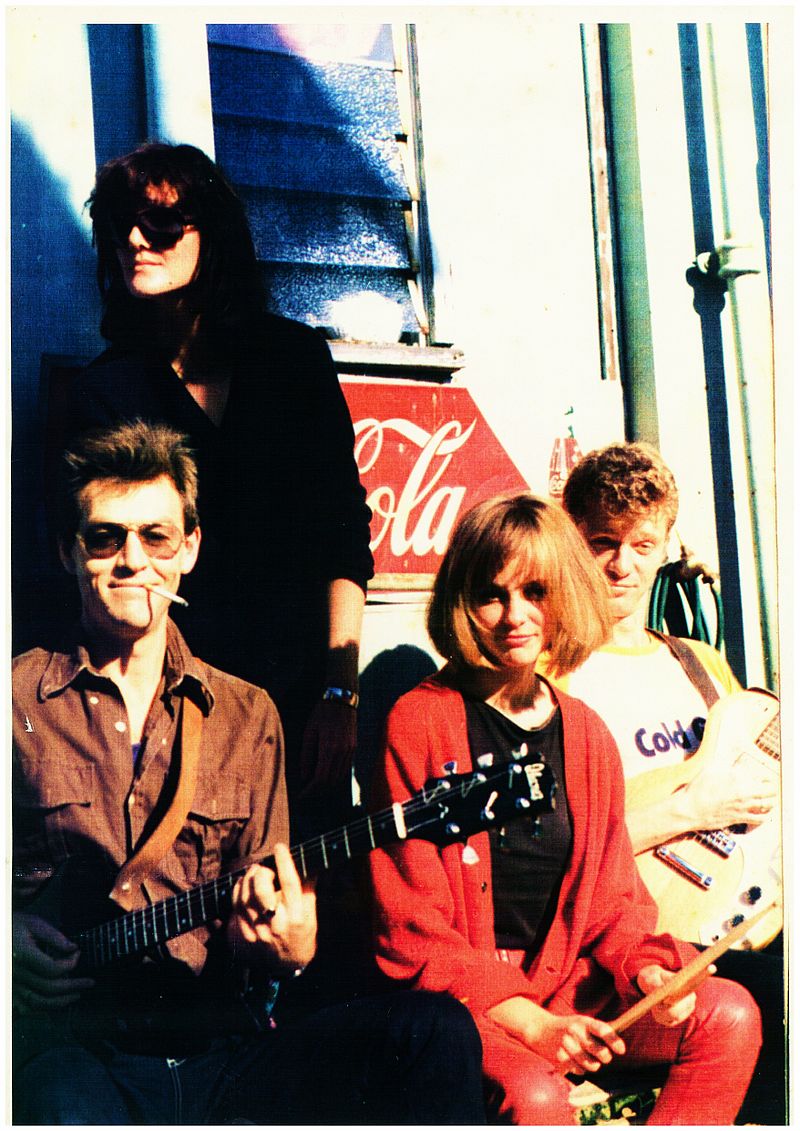XL Capris
Origin Sydney, Australia
Genres Punk, Rock
Years active 1978–1982
XL Capris were an Australian indie-punk band formed in Sydney in 1978 by Julie Anderson, Tim Gooding, Johanna Pigott and Kimble Rendall.
Their best known single was a punk version of Tommy Leonetti’s “My City of Sydney” (1979). This single was the only Australian disc found in legendary UK DJ John Peel’s “battered wooden box” of 142 favourite records when, following his death in 2004, the contents of the box were revealed to the public in a Channel 4 television special. XL Capris made two albums, Where Is Hank? (March, 1981) and Weeds (October, 1981) both produced by Todd Hunter of New Zealand/Australian band Dragon and released on their own label Axle Records. Hunter later joined XL Capris as guitarist and subsequently married Pigott; they became a successful songwriting team: cowriting “Rain” for Dragon and “Age of Reason” for John Farnham.
Prior to forming the XL Capris, Gooding was a film and television screenwriter.(The Aunty Jack Show; Wollongong The Brave/Kev Kevanagh: Beyond The Infinite; Heatwave). He and Pigott worked together creating the 1984 ABC-TV series Sweet and Sour which chronicled the activities of a fictional band, The Takeaways, and their efforts to succeed in 1980s Sydney Pop music scene.
Gooding and Pigott had studied Architecture during the early 1970s at the University of Sydney along with friend Angela Webber. Early practice sessions by XL Capris were held in the front room of a rented house where Gooding (and later Rendall) lived. The mattress soundproofing was not effective and the band threatened with eviction. Practice was relocated to a lightproof and airproof shed in the grounds of the infamous Cockroach Towers.
Each band member had a punk nickname: Pigott (bass, vocal, keyboard, guitar) was ‘Alligator Bagg’, Gooding (guitar, keyboard, vocal): ‘Errol Cruz’, Anderson (drum): ‘Nancy Serapax’ and Rendall (guitar, vocal): ‘Dag Rattler’.
Their first single was a punk version of Tommy Leonetti’s “My City of Sydney” (1979), arranged by Gooding. The promo video, recorded at the Sheraton Hotel in a room The Beatles had occupied during their Australian tour, featured the four band members in bed together! The single received much independent radio airplay but was not a commercial success. It is one of the 143 singles stored in a small wooden box by British DJ John Peel that is the subject of the television documentary John Peel’s Record Box.
“Skylab (Son of Telstar)”, written by Gooding and Rendall, received radio airplay as a tape in mid 1979. It was never released as a single and did not appear on either of the XL Capris’ two albums. The song does feature on later compilation albums featuring independent bands of the period.
Their next single, “World War Three” (October 1980, produced by Hunter) was written by Pigott and Hunter. Rendall left to form Le Hoodoo Gurus in January 1981. He later became a music video director and then a second unit director for the latter two Matrix series movies. He was replaced by Hunter (guitar), Michael Chirnside (bass) joined, Anderson left to be replaced by Michael Farmer (drums). Barry Blackler (drums) also joined.
Discography
Albums
Where Is Hank?
Axle Records, released March, 1981.
Recorded by Christo, Studio 301.
Produced by Todd Hunter.
Track listing[edit]
“World War 3” (Johanna Pigott, Todd Hunter)[1] — 3:38
“Fat Boy in the Swimming Pool” (Tim Gooding)[1] — 2:53
“Red Bikini Runaway” (Gooding, Pigott)[1] — 2:58
“Refrigerator Town” (Gooding)[1] — 2:34
“Evelyn” (Pigott)[1] — 2:36
“Hey Marvo!” — 0:07
“Police Exhibit” (Gooding)[1] — 4:19
“Button B” (Gooding)[1] — 2:49
“On the Beach” (Gooding)[1] — 3:27
“Shark Horror” (Gooding)[1] — 2:41
“Parramatta Road” (Gooding)[1] — 2:46
“Hi Rise Heart” (Pigott, Gooding) — 3:00
“J O’K / Shout” (Gooding / Rudolph Isley, Ronald Isley, O’Kelly Isley Jr)[1] — 5:24
“Ou Est Hank?” (Rendall) — 2:08
Weeds[edit]
Axle Records, released October, 1981
Produced by Hunter.
Track listing[edit]
“Tokyo” (Pigott, Hunter)[1]
“Igloos” (Pigott, Hunter)[1]
“Quiet World” (Pigott, Hunter)[1]
“Killer Seas” (Gooding)[1]
“Geography” (Gooding)[1]
“Country Town” (Gooding)[1]
“A M P” (Gooding)[1]
“Spirit of Progress” aka “Ghost Train” (Gooding)[1]
“Poor Excuse” (Gooding)[1]
“Please Excuse Me (I’ve Got to Look After My Car)” aka “Car” (Pigott)[1]
“Small Screen Cowboy” (Pigott, Hunter)[1]
“Dark Star” (Pigott, Hunter)[1]
“Luna” (Pigott, Hunter)[1]
Singles[edit]
“My City of Sydney” (Tommy Leonetti, Robert Troup)[1] — 2:43 / “Dead Budgies” (Rendall) (1979)
“World War 3” (Pigott, Hunter) / “Dusty” (Gooding) (October, 1980)
“Red Bikini Runaway” (Gooding, Pigott) / “K-Tel City” (Gooding) (April, 1981)
“Igloos”/”Elevator” (1981)
“Dead Budgies (going cheep)” included Marc Hunter. A send up of the Bee Gees, early 1980s

